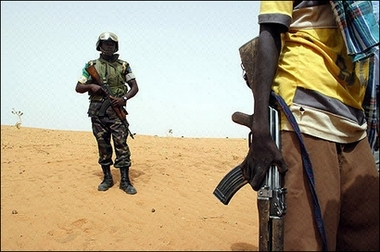WASHINGTON - The United States is showing frustration over the United
Nations' inability to force Sudan's government to accept UN peacekeepers for
strife-torn Darfur.
Sudan has so far opposed a UN peacekeeping mission for Darfur, whose crisis
has been branded by Washington as genocide, and this week expelled the world
body's special representative after he said Sudan's military had suffered major
losses against rebels.
|

An African Union soldier stands guard as a rebel from the
Sudan Liberation Army talks with members of an AU patrol outside the
village of Fakili in Darfur, June 2006. The United States is showing
frustration over the United Nations' inability to force Sudan's government
to accept UN peacekeepers for strife-torn Darfur.
[AFP]
|
US Secretary of State Condoleezza Rice denounced UN envoy Jan Pronk's
expulsion as "unfortunate in the extreme" and implicitly noted the UN's
inability to force an end to the killings against Darfur civilians.
"The situation in Darfur is deteriorating and the international community
needs to be able to act there," Rice said Monday.
Washington has actively campaigned for months for the deployment of UN troops
to end the civil war, which since its outbreak in 2003 has left 200,000 dead due
to fighting, famine and disease.
The UN Security Council adopted a resolution on August 31 calling for the
deployment of up to 20,000 peacekeepers to replace an under-funded African Union
(AU) contingent that has failed to restore peace and stability in Darfur.
The United States has said that the UN force could be deployed without
Khartoum's approval, but it is the only country to say so.
A senior State Department official admitted that the Darfur conflict was
testing the limits of the multilateral approach President George W. Bush has
adopted since the start of his second term in January 2005.
"Have these resolutions and the energy applied by some members of the
international community been what we would have hoped? No. Of course not," said
the official, who requested anonymity.
"We did not write the resolution ourselves but that is the nature of -- I
would point out -- multilateral diplomacy," he told reporters.
"In fact, without the United States' efforts, you would not have the modest
changes and gains that you have had, and lives have been saved as a result," the
official added.
Bush has named his own special envoy to Darfur, former ambassador Andrew
Natsios, and Rice often mentions the conflict during official trips abroad, from
Egypt to China last week.
Natsios recently returned from Egypt after a week-long visit to Sudan, his
first since Bush named him his special envoy for Darfur earlier this month.
| 1 | 2 |  |